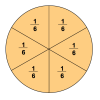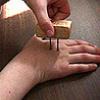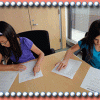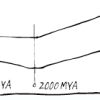Search Results
Showing results 21 to 40 of 53
Number Flips
Source Institutions
In this math activity, learners play a number game to explore the relationships between numbers, combinations, and the concept of equivalency.

Number Sense and Computation: To Half or Half Not
Source Institutions
In this math lesson, learners use slices of bread and geoboards to explore several ways to divide a rectangle in half. Learners also identify equivalent fractions that represent one-half.

Our Sense of Touch: Two-Point Discrimination
Source Institutions
In this activity, learners investigate the touch sensory system and discover how to plan and carry out their own experiments.

Dollar Signs
Source Institutions
In this activity, learners use number sense and mental math strategies to estimate the price of a sign.

Read With Your Fingers
Source Institutions
In this activity, learners work in partners to create and exchange messages written in Braille. Learners use a Braille key and thumbtacks to write their messages in Braille.

Jumping to Conclusions
Source Institutions
In this online brain stumper, the bottom half of a series of letters is covered. You may think you know what it says, but remove the black bar to see if you're right.
Are you a Supertaster?
Source Institutions
In this activity, learners examine their tongue and taste buds.

FAMILY MATH on the Go
Source Institutions
This assortment of mathematical games can be played while traveling.

Size It Up
Source Institutions
In this artistic activity, learners blow up a smaller picture into a larger one, by using a grid.

Metric Capers
Source Institutions
In this outdoor activity, learners measure familiar objects in nature to practice working with the metric system.

Finding the Size of the Sun and Moon
Source Institutions
In this activity, learners build a simple pinhole viewer. They use this apparatus to project images from a variety of light sources, including a candle, the Sun, and the Moon.

Tasty Buds
Source Institutions
In this activity (1st activity on the page), learners explore their sense of taste and the structure of the tongue by taste-testing various foods.

Where Was That?
Source Institutions
In this activity (9th activity on the page), learners work in pairs to see how their perception of touch differs from reality.

A Penny Saved is a Penny Heard
Source Institutions
In this activity (11th activity on the page), learners use pennies to test their hearing acuity.
Soaring Towers: Building with Recycled Materials
Source Institutions
In this activity, learners will build the highest tower they can out of recycled materials.

Built in Stopwatch
Source Institutions
In this activity (3rd on the page), learners investigate circadian rhythms by examining how well people do with estimating time.

Big Time Tour
Source Institutions
In this activity (on pages 16-21), learners get a sense of geological time by understanding how big a million is.
How Many In a Minute
Source Institutions
In this activity, learners will keep track of how much they can do in one minute. Instructors can pick something everyone will do for a minute, such as jumping up and down or drawing stars.

Exploring Size: Scented Solutions
Source Institutions
This is an activity in which learners will find that they can detect differences in concentration better with their nose (smelling) than with their eyes (seeing).

Half Full or Half Empty
Source Institutions
In this activity (12th activity on the page), learners conduct an experiment to demonstrate how muscles are constantly feeding information to the brain about what they are doing.
